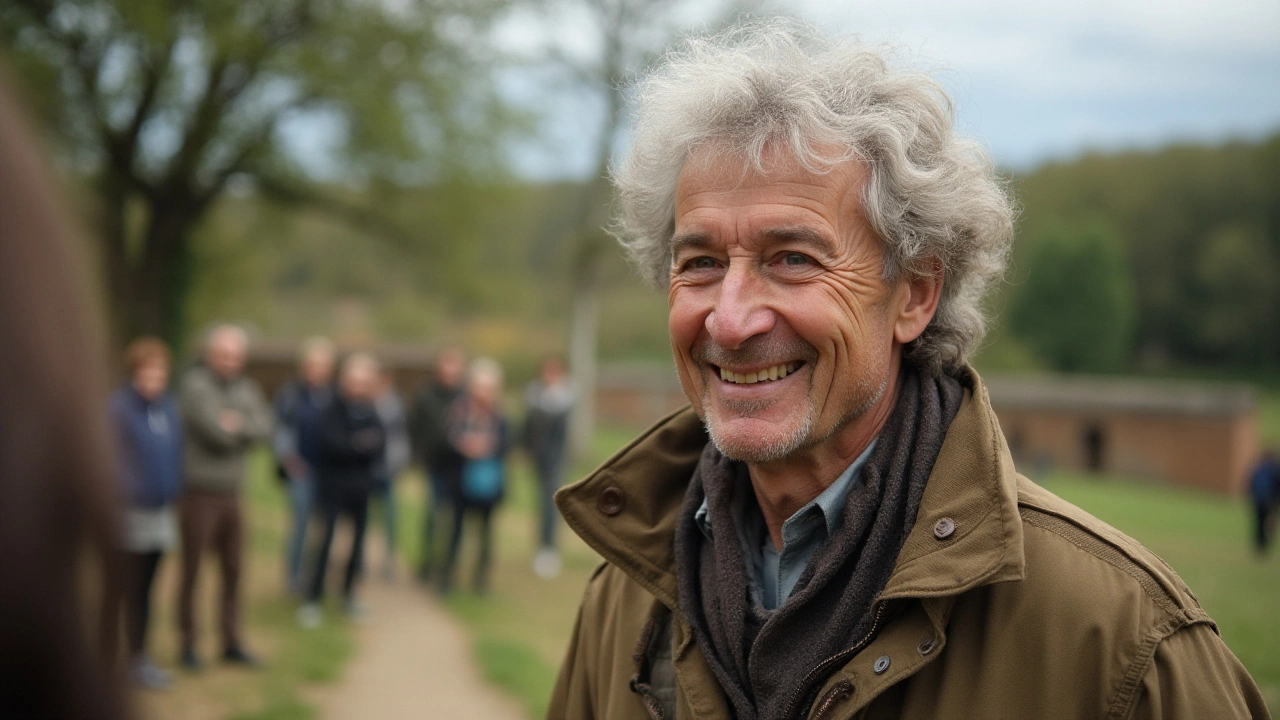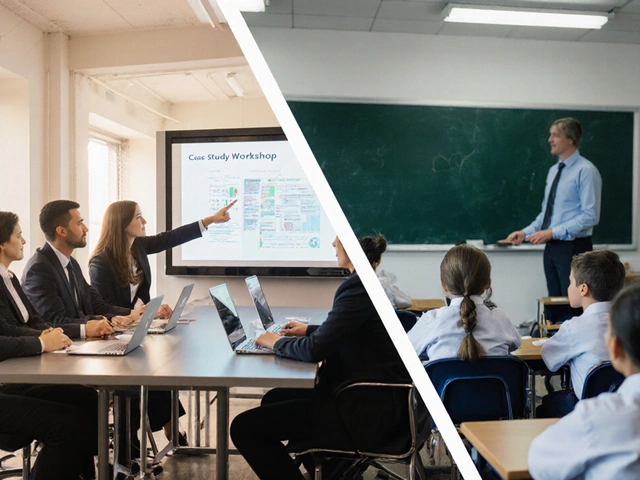The realm of adult education presents a unique set of challenges and opportunities for educators and learners alike. Unlike their younger counterparts, adult learners bring to the table a rich tapestry of life experiences and maturity, which influences how they engage with new information. As a result, the methods for teaching adults must be adapted to suit their distinct needs.
Adult education theory provides a framework that helps educators understand these dynamics. These theories delve into how adults learn, what motivates them, and the best strategies to enhance their educational journeys. By comprehending these concepts, educators can tailor their approaches to more effectively support adult learners, resulting in a more impactful and meaningful educational experience.
- Defining Adult Education Theory
- Key Learning Theories for Adults
- Challenges in Adult Education
- Practical Applications of Theories
Defining Adult Education Theory
Adult education theory is a cornerstone in understanding how grown individuals assimilate knowledge. Unlike traditional education aimed at younger students, adult education encompasses unique methodologies suited to the cognitive and experiential maturity found in adults. Fundamentally, these theories acknowledge that adults enter learning environments as voluntary and self-directed learners, often with clear goals and expectations. Malcolm Knowles, a pivotal figure in the field, introduced the idea of andragogy—contrasting it with pedagogy—to emphasize that adults learn differently. Knowles suggested that since adults are often result-oriented, they are more likely to engage deeply with content that is immediately relevant to their personal or professional lives.
A significant factor in these theories is the understanding of prior experience as a resource. Adults bring wealth from their lived experiences, which not only influence their learning process but also serve as a valuable contribution to group learning. This aspect makes methods such as discussions and peer education highly effective. Another interesting facet of adult learning is motivation. Unlike children, adult learners often have intrinsic motives, where learning is pursued to fulfill personal satisfaction or career advancement. This difference in motivation frequently leads to a stronger commitment to educational pursuits and resilience in overcoming learning barriers.
The Role of Context in Adult Learning
The context in which adults learn is just as critical. Adults tend to thrive in environments where learning is problem-centered rather than content-oriented. This concept aligns with the theory that adults are practical and seek education to solve issues they face in daily life. Acknowledging and accommodating these needs can lead to enhanced engagement and successful outcomes in educational settings.
"Adult learning is problem-centered rather than content-oriented." - Malcolm KnowlesThe theory further posits that adults prefer to know the reason for learning something before they invest their time in it. This is why adults tend to respond well to having learning objectives transparently outlined at the onset of educational endeavors.
Assessing the impact and efficacy of different educational strategies remains a vivid area of research. Various studies reveal that utilizing experience-based techniques and offering flexible learning paths can dramatically improve adult learning outcomes. Studies also indicate differences in learning preferences, with some adults favoring visual aids, while others thrive through auditory or kinesthetic stimuli. Understanding these preferences is crucial in offering personalized educational experiences, thereby increasing the likelihood of success. In highlighting this, the research encourages educators to adapt various approaches to meet the diverse needs of their adult learners.

Key Learning Theories for Adults
Understanding the core principles of adult learning theories is indispensable for anyone venturing into the field of adult education. One of the primary theories that has guided educators is Malcolm Knowles' concept of Andragogy. Knowles posited that adults are self-directed learners who bring with them a wealth of experience that shapes how they engage with learning materials. This theory underlines the importance of relating new information to past experiences, which makes learning more relevant and meaningful for adults. Unlike pedagogical strategies, which focus on children and adolescents, andragogy encourages a more collaborative and problem-solving approach, valuing the learners' input as much as the instructor's guidance.
Another significant theory is Transformative Learning, introduced by Jack Mezirow. This theory focuses on how adults can change their worldviews as they engage with new information and perspectives. Transformative learning is often an emotional and cognitive journey, requiring critical reflection. By questioning their assumptions and beliefs, adults can start to understand the world in a more nuanced, multi-dimensional way. The classroom, or any learning environment, becomes a place for dialogue and exploration, rather than one-way communication. Mezirow’s approach invites educators to create a safe space for deliberation, where learners are encouraged to critique existing paradigms and develop their capacity for independent thought.
"A transformative learning process, focused on becoming critically aware of one's own assumptions, generates insight that guides future actions and enriches individual perspectives." — Jack Mezirow
Social Learning Theory, developed by Albert Bandura, also plays a pivotal role in understanding adult behavior in educational contexts. This theory highlights the importance of social interactions in the learning process. Bandura emphasized that learning can occur simply through observation and imitation, without the necessity of direct instruction. This aspect of the theory is particularly applicable in adult settings, as adults often learn from their peers, mentors, and even family members. The efficacy of learning through modeling has far-reaching implications in workplaces, community learning groups, and informal settings, offering practical applications for adult educators keen on fostering collaborative environments.
Moreover, the Experiential Learning Theory by David Kolb is instrumental in crafting effective educational strategies for adult learners. Kolb's model, often depicted as a cycle, involves concrete experience, reflective observation, abstract conceptualization, and active experimentation. In this model, adults are encouraged to relate theories to real-world situations, engage in meaningful reflection, and apply their insights to new situations. Experiential learning is particularly valued among adults who thrive when theory is anchored in practical, hands-on contexts. This resonates with the ongoing need for learning that adults can directly apply to their personal and professional lives, thereby enhancing both competency and confidence in various fields.
In practice, these theories can significantly transform the landscape of adult education, making it a more adaptive, learner-centered domain that respects and leverages adults' complex backgrounds. When educators integrate these principles into their strategies, they create a dynamic learning environment that recognizes adult learners as active participants in their educational journey. This not only fosters a deeper engagement but also empowers learners to harness their potential fully. As adult education continues to evolve, these foundational theories remain central to its development and effectiveness, providing educators with the tools necessary to cultivate enriched, transformative learning experiences.

Challenges in Adult Education
Adult education, while richly rewarding, is fraught with a multitude of challenges that can hinder the learning process. One significant challenge is the motivation of adult learners. Unlike younger students who might attend school out of obligation, adults often juggle multiple responsibilities, such as family, work, and personal commitments, making it difficult to prioritize their education. This balancing act can negatively impact an adult learner's ability to engage consistently with their education.
Another major challenge is the diversity of learning theories and styles that educators must address within a single classroom setting. Adult learners come from varied backgrounds and have unique learning preferences and experiences, which can complicate the task for educators to devise a one-size-fits-all solution. Strategies that work for one individual might not be effective for another, necessitating a flexible teaching approach that can adapt to individual needs.
Technology is both a boon and a bane in adult education. While online courses and digital resources offer unprecedented access and flexibility, they also present a challenge for some adult learners. Those who are not tech-savvy may find themselves struggling with the digital divide, where lack of access to digital tools or the internet can be a significant barrier. This gap can be intimidating for some, causing anxiety and reluctance to engage fully in the educational process, thereby stalling their educational strategies development.
"Education is the most powerful weapon which you can use to change the world." – Nelson Mandela
Financial constraints also play a pivotal role in shaping the challenges faced by adult learners. Many adults are unable to afford tuition fees or the cost associated with further education because they are already committed to financial responsibilities. This challenge is exacerbated by the need for some to maintain their current employment while studying, which can lead to scheduling conflicts and increased stress. Balancing these demands can prove overwhelming and discouraging, potentially leading to decreased motivation.
In addressing the unique needs of adult learners, it's crucial to consider the psychological barriers prevalent among adults. Many feel apprehensive about returning to a learning environment, fearing they will not measure up or blend in with their younger counterparts. This psychological barrier can manifest as a lack of confidence, ultimately diminishing the capacity to absorb and retain information. Educational institutions must address these fears and cultivate an inclusive and supportive learning community to alleviate these concerns.

Practical Applications of Theories
Applying adult education theories in real-world settings can revolutionize how adult learners acquire new skills and knowledge. These theories emphasize active learning, considering the unique experiences, motivations, and needs adults bring into the educational framework. One pivotal concept is experiential learning, famously introduced by David Kolb. His model involves a four-stage cycle: concrete experience, reflective observation, abstract conceptualization, and active experimentation. In practice, this means instructors should create lessons that are not just informative but deeply engaging, allowing adults to draw on prior experiences and test out new ideas.
Another significant framework is Malcolm Knowles' Andragogy, which specifically caters to the characteristics of adult learning. Knowles highlighted self-directed learning, suggesting adults prefer taking control of their education. Classrooms should thus shift towards more learner-centered approaches where facilitators guide rather than direct learning. This can be achieved through discussions, problem-based learning, and collaborative projects, which empower learners to set their own goals and dive deeply into subjects of personal and professional relevance.
Technology plays a crucial role today, offering myriad tools that align with adult learning theories. Online platforms allow flexible learning environments that are accessible anytime, anywhere. This flexibility supports adults balancing work, family, and education, making digital resources indispensable for modern adult education. Coursera and edX, for example, offer self-paced courses that respect adult learners' need for autonomy and convenience. Moreover, incorporating real-world scenarios through case studies or simulation tools can enhance engagement by making learning relatable and context-specific.
The workplace also provides an excellent venue for the application of adult learning theories. Professional development programs are most effective when they are continuous, contextual, and relevant. Companies that integrate personalized learning paths and mentoring opportunities see increased employee satisfaction and productivity. As Peter Senge famously stated, "The only sustainable competitive advantage is an organization’s ability to learn faster than the competition." Recognizing this, training departments focus on cultivating environments that encourage staff to learn from each other, rather than just from structured courses, leading to a more dynamic and adaptable workforce.
Each theory offers a piece of the puzzle in designing effective adult education programs. Combining these theories, educators can construct rich, diverse learning experiences that honor adult learners' backgrounds while pushing them towards new insights. The blend of experience-based learning, self-directed learning, and technological integration ensures that adults not only absorb information but also retain and apply it, transforming education into a truly lifelong journey.






